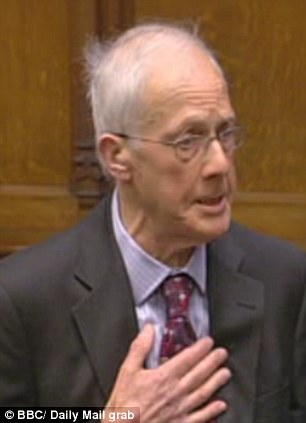
Sir Andrew Nicol Secret Courts
Backlash over Britain's first secret terror trial: MPs call for urgent debate over plans to set 'dangerous precedent' by holding case behind closed doors
06/05/2014 21:11:00 //
By Chris Greenwood and James Slack
Published: 00:06 GMT, 6 June 2014

Dangerous precedent: Labour MP David Winnick said MPs must be given a chance to debate whether aa major terrorism trial should be held in secret
MPs from across the political spectrum yesterday condemned plans to hold a major terrorism trial in secret and called for an urgent parliamentary debate on the growing controversy.
The case – in which a judge declared he would try two suspected terrorists entirely behind closed doors – was described as a ‘dangerous precedent’ which will change the British legal landscape forever.
His momentous decision – a legal first – was revealed only after this newspaper and other media organisations challenged it at the Court of Appeal.
Last night, Labour MP David Winnick, who sits on the Commons Home Affairs Committee, said MPs must be given a chance to debate such an important matter.
‘Parliament should be very concerned indeed that the proceedings are to be held entirely in private for the first time in centuries,’ he said.
‘If this goes ahead, it may well be the case that in future the argument will be made that there is justification for other cases to be so heard.
‘I wouldn’t challenge the fact that some of the evidence may be sensitive and there is an argument for some of the evidence to be taken in private, but to take the whole case in private is, to say the least, unfortunate.’ Other trials, often involving spies or state secrets, have been held partly in secret.
The two men, known only as AB and CD, are due to enter a dock at the Old Bailey on June 16 accused of a terror plot.
The trial judge, Mr Justice Nicol, has ruled the case will be held in secret and the public will not even know the men’s names for unknown ‘national security’ reasons.
A draconian gagging order, which prevented the media reporting even the existence of the case, was overturned at the Court of Appeal by three top judges. They are now considering whether to uphold the secrecy bid.
Yesterday, Justice Secretary Chris Grayling insisted he is ‘very confident’ the judges will act in the ‘interests of justice’.
He told the BBC: ‘I know our senior judiciary very well. I know that they will want to protect the interests of justice, and I am very confident that if they take a decision on a very difficult matter like this, they will do so in the interests of justice.
SO MUCH FOR OPEN JUSTICE, M'LUD

Outspoken: Judge Sir Andrew Nicol
The top judge behind Britain’s first ever secret trial has been an outspoken advocate of open justice throughout his career.
Sir Andrew Nicol is an expert on media law and co-author of several books in which he makes clear justice must be seen to be done.
And he has previously boasted that the courts, unlike the machinations of government, are not ‘swathed in secrecy’.
But Sir Andrew, referred to in court as Mr Justice Nicol, also points out that the right to an open trial is ‘not unqualified’.
Writing five years ago, he said a trial could be held wholly or partly in secret for national security reasons, to uphold public order or even in the ‘interests of morals’.
Mr Justice Nicol has presided over a series of high profile trials, including the acquittal of a Tottenham man accused of murdering PC Keith Blakelock earlier this year.
'In this particular case, if there is really good reason, if it is in the interests of justice for the judge to decide in one way or the other, so be it.’
But MPs and campaigners said they have grave reservations that secret justice could leave lingering uncomfortable questions over the outcome of the trial.
David Blunkett, a former home secretary, said he was ‘mystified’ by the decision, and that it amounted to a ‘removal of open justice’.

David Blunkett, a former home secretary, said he was 'mystified' by the decision
‘In some cases, there can be justification in terms of the kind of evidence which requires presenting in secret, but it would appear that there is no clarification as to whether this is the case here,’ he said.
Tory MP Dominic Raab branded secret trials ‘illiberal and anti-British’. ‘The Government must explain why this is necessary to protect national security,’ he said.
Lord Macdonald, a Liberal Democrat peer and a former director of public prosecutions, said justice must be seen to be done ‘99.9 per cent of the time’, but added ‘exceptional circumstances’ could justify the secrecy.
Labour justice spokesman Sadiq Khan said the courts must find a way to lift the ‘cloak of secrecy’ as much as possible to avoid public confidence being undermined.
He added: ‘While there will always be exceptional circumstances in which parts of cases may need to be held in secret, very important questions need answering as to why in this instance the whole case needs be held in secret.’
The Court of Appeal ruling will be made public ‘within days’.
Last night, David Anderson QC, the Independent Reviewer of Terrorism Legislation, said the media is ‘absolutely right’ to challenge the secrecy.
He said: ‘We’ve always operated on the principle that justice must not only be done, but be seen to be done.’
But he added ‘there is no reason it shouldn’t be a fair trial’ because a jury, the judge and defendants will all hear the evidence against them.